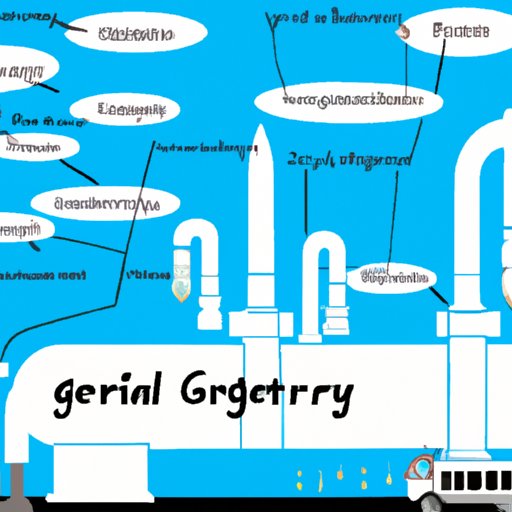Introduction
Natural gas is a combustible mixture of hydrocarbon gases formed deep beneath the Earth’s surface. It is composed of methane and other hydrocarbons such as ethane, propane, butane, and pentane. Natural gas is one of the most versatile and widely used energy sources in the world. This article will provide an overview of how natural gas works, from its generation to its extraction and transportation processes, as well as its various benefits and drawbacks.

Explaining the Basics of How Natural Gas Works
Fossil fuels are formed over millions of years from the remains of plants and animals that have been buried under layers of sediment and exposed to intense heat and pressure. Natural gas is a type of fossil fuel that is found within porous rock formations deep underground. It is usually associated with oil deposits and is often extracted alongside oil.
The chemical makeup of natural gas is primarily methane, which is odorless and colorless. Other hydrocarbons such as ethane, propane, butane and pentane can also be present in natural gas. Natural gas is generated by the decomposition of organic matter in the absence of oxygen over millions of years. As the organic matter breaks down, it produces methane and other hydrocarbons, which accumulate in underground reservoirs.
The Process of Extracting and Transporting Natural Gas
There are several methods for extracting natural gas from underground reserves. The most common method of extraction is drilling, which involves drilling a vertical or horizontal well into the reservoir. This method is typically used for shallow reservoirs located close to the surface. For deeper reservoirs, hydraulic fracturing, or “fracking”, is often used. In this process, water, sand and chemicals are injected into the well at high pressure to fracture the rock and release the natural gas.
Each extraction method has its own pros and cons. Drilling is less expensive and less intrusive than fracking, but it is not always effective for deep reservoirs. Fracking can be more costly and can cause environmental damage, but it is more effective for deep reservoirs. Regardless of the extraction method used, the natural gas is then transported through a network of pipelines to processing plants where it is cleaned, separated, and stored.
Analyzing the Benefits and Drawbacks of Natural Gas
Natural gas has several advantages over other energy sources. It is abundant, affordable, and clean-burning. It produces fewer emissions than coal or oil, making it a more environmentally friendly option. It is also easy to transport and store, making it a reliable energy source.
However, there are some drawbacks to using natural gas. It can be dangerous if not handled properly and can cause explosions or fires. Additionally, natural gas production can lead to air and water pollution if not properly regulated. Finally, natural gas is a non-renewable resource, so its use must be carefully managed to ensure that it is used responsibly.
Examining Different Types of Natural Gas
There are several different types of natural gas, each with its own advantages and disadvantages. Dry natural gas is the most common type and consists mainly of methane. Wet natural gas contains higher levels of other hydrocarbons such as ethane, propane, and butane, and is often used as a feedstock for the chemical industry. Shale gas is a newer form of natural gas found in shale deposits and is produced using fracking.
Dry natural gas is the most efficient and least expensive type to produce, but it has the lowest energy content. Wet natural gas is more expensive to produce but has a higher energy content and is more versatile. Shale gas is the newest type of natural gas and is the most energy-dense, but it is also the most expensive to produce.

Understanding Regulations and Safety Measures for Natural Gas
The use and production of natural gas is regulated by local, state, and federal governments. These regulations are designed to protect public health and safety and to ensure that natural gas is produced and used responsibly. Regulations cover a wide range of topics, including the extraction process, storage and transportation, and safety standards.
Safety measures for handling natural gas include proper ventilation, leak detection systems, and personal protective equipment. It is important to follow these safety measures to prevent accidents and ensure the safe use of natural gas.

Highlighting the Economic and Environmental Impacts of Natural Gas
The use of natural gas has both economic and environmental impacts. On the economic side, natural gas is an affordable and reliable energy source that has helped to reduce energy costs for consumers. It has also created jobs in the energy sector and improved the economic stability of many countries.
On the environmental side, natural gas is a cleaner-burning fuel than coal or oil, meaning it produces fewer emissions. However, natural gas production can still lead to air and water pollution if not properly regulated. Additionally, methane leaks from natural gas infrastructure can contribute to global warming.
Conclusion
In conclusion, natural gas is a versatile and widely used energy source that has both economic and environmental benefits and drawbacks. Understanding how natural gas works and its different types is essential to responsible use. Regulations and safety measures must be followed to ensure the safe handling of natural gas and to minimize its environmental impact.
(Note: Is this article not meeting your expectations? Do you have knowledge or insights to share? Unlock new opportunities and expand your reach by joining our authors team. Click Registration to join us and share your expertise with our readers.)
